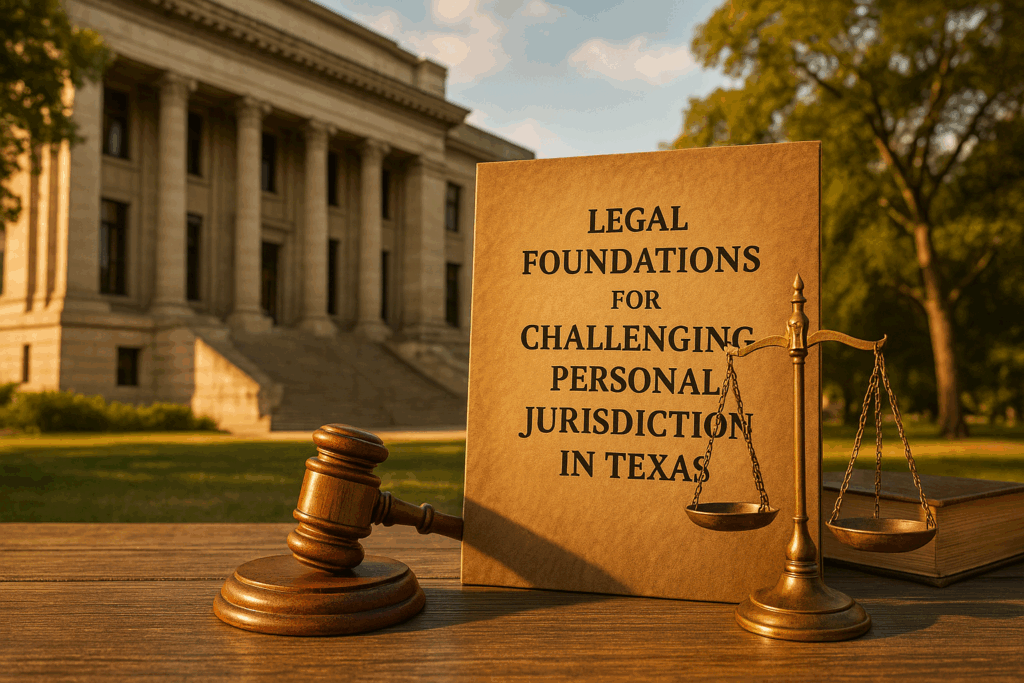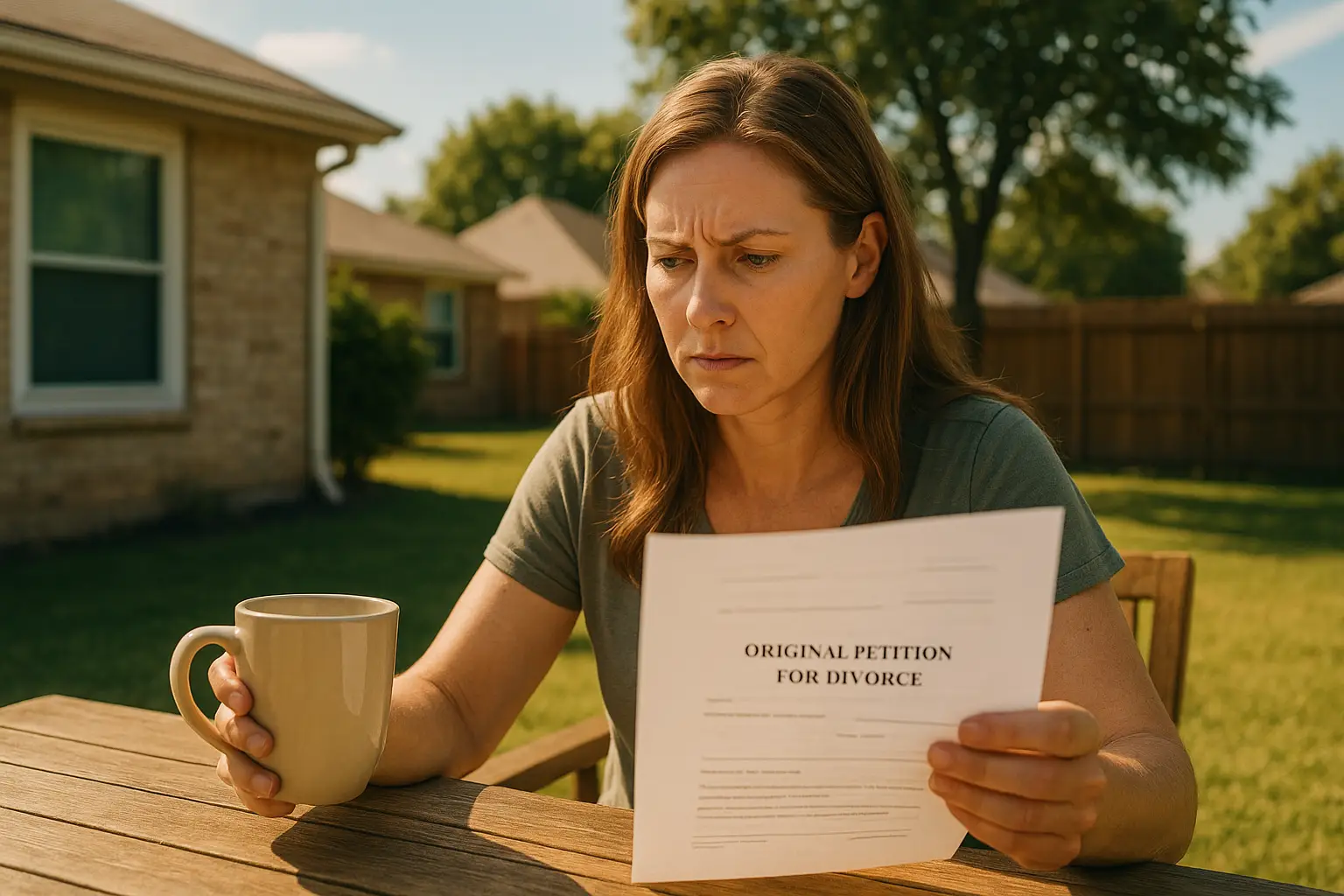
Ever get a text or letter that made you stop mid-sip of your coffee and think, “Wait, what now?” Imagine opening your mailbox to find divorce papers from Texas—even though you haven’t lived there in years. Suddenly, you’re being dragged into a courtroom hundreds of miles away, and the stakes? Your property, your parenting time, and your child’s schooling. Welcome to the world of Texas Divorce Challenging Personal Jurisdiction, where legal geography can have serious consequences for your family’s future.
So, what’s the short answer? Yes, you can challenge Texas jurisdiction if you don’t have sufficient ties to the state—but you need to act fast, follow the right steps, and avoid some common traps. This blog is your guide to understanding how personal jurisdiction works in a Texas divorce, why it matters for things like custody and support, and what you can do if Texas tries to claim authority it might not actually have.
We’ll also dig into how these jurisdiction issues affect your child’s academic life—from sudden school changes to emotional fallout—and give you practical, real-world tips to keep your child on track. Whether you’re an out-of-state parent, a military family, or someone navigating a cross-border custody case, we’ll show you how to protect what matters most.
At The Law Office of Bryan Fagan, PLLC, we believe in educating families and protecting futures. So grab a seat (and maybe a fresh cup of coffee)—because what you’ll learn here could make all the difference.
Key Takeaways
- Personal jurisdiction in Texas divorce law affects the enforceability of court decisions related to custody, support, and property division, requiring spouses to establish sufficient ties to the state.
- Challenging personal jurisdiction involves filing a special appearance under Texas Rule of Civil Procedure 120a, ensuring this is the first document submitted to avoid waiving the right to contest jurisdiction.
- Engaging an experienced Texas family law attorney is crucial for navigating jurisdictional challenges, as they provide essential guidance in preparing legal documents and representing your interests effectively in court.

Your Family’s Future Starts Here
Don’t navigate your legal journey alone. Schedule a consultation now and get the clarity and support you deserve.
What is Personal Jurisdiction in Texas Divorce Law?
When facing a Texas Divorce Challenging Personal Jurisdiction, it’s essential to understand that Texas courts cannot issue binding orders over someone who lacks sufficient connection to the state. Personal jurisdiction refers to a court’s authority over the individuals involved in a case, not just the legal issues themselves. Without it, any rulings on matters like child custody, spousal support, or property division could be invalid. This makes it critical to evaluate whether Texas is the proper venue before responding to a divorce petition—especially if you or your spouse live elsewhere.
According to Texas Family Code § 6.301, a divorce may be filed in Texas only if one spouse has been a domiciliary of the state for at least six months and a resident of the county for at least 90 days. But even when these residency requirements are met, the court still needs personal jurisdiction over the non-resident spouse to issue enforceable rulings. This often comes down to whether that spouse has minimum contacts with Texas—such as owning property, conducting business, or having frequent interactions in the state.
If you’ve received divorce papers in Texas but believe the court lacks authority over you, it’s important to act fast. Filing a special appearance before any other pleadings allows you to challenge the court’s jurisdiction without waiving your objection. Our attorneys often see cases where failing to raise this issue properly leads to unnecessary litigation or orders that are later unenforceable. For a deeper understanding of how to protect yourself in this situation, visit our guide on out-of-state spouse rights and objections.
At The Law Office of Bryan Fagan, PLLC, we’ve helped countless clients navigate jurisdictional challenges with clarity and confidence. Whether you’re a military family, an out-of-state parent, or simply unsure whether Texas courts have the authority to decide your case, our team is here to guide you. Protecting your rights starts with understanding the rules—and partnering with a legal team that knows how to use them in your favor.

Legal Foundations for Challenging Personal Jurisdiction
Contesting jurisdiction in a Texas Divorce Challenging Personal Jurisdiction case involves more than just questioning where the case was filed—it’s about asserting your constitutional rights. Under the due process clause, a Texas court can only exercise personal jurisdiction over a non-resident spouse if there are sufficient minimum contacts with the state. This ensures that legal proceedings adhere to fair play and substantial justice, preventing individuals from being pulled into courts where they have no meaningful ties.
Texas law reinforces these protections through provisions in the Texas Family Code. For instance, even if a Texas court lacks personal jurisdiction over a non-resident spouse, it may still exercise quasi in rem jurisdiction under the Texas long-arm statute to adjudicate marital property located within the state. As outlined in Texas Family Code § 6.305, this allows courts to divide property fairly when it sits in Texas, even if one spouse lives elsewhere. This often applies in cases where a couple owns real estate or business assets in Texas, making jurisdictional issues especially relevant.
Timing also matters. Texas Family Code § 6.305(a)(4) allows courts to establish personal jurisdiction if the divorce is filed within two years of the couple’s last marital residence in Texas. This rule underscores how even past connections to Texas can impact the court’s authority, especially when disputes involve custody or community property. Our attorneys frequently advise that strategic timing and precise pleadings are essential to successfully contesting improper jurisdiction—or enforcing it when Texas is the appropriate venue.
Because jurisdictional challenges involve both state and federal legal principles, working with an experienced family law attorney is key. Our team understands how to leverage these laws to your advantage, ensuring your case is heard in the right court. For more insight into how legal counsel helps in cross-border cases, explore this guide on navigating the role of a Texas family law attorney in out-of-state divorce. You can also learn more about when Texas has custody jurisdiction in complex family law cases.

Filing a Special Appearance Under Texas Rule of Civil Procedure 120a
The procedural cornerstone for contesting personal jurisdiction in Texas divorce cases is filing a special appearance. This legal maneuver:
- Allows you to contest jurisdiction without submitting to it, essentially putting the court’s authority on trial.
- Must show that the court lacks personal jurisdiction.
- Requires support by affidavits based on personal knowledge.
Initiate the process by filing a special appearance under Texas Rule of Civil Procedure 120a. This document must be the first one submitted in your case to avoid waiving your right to challenge jurisdiction. Submit supporting affidavits at least seven days before the hearing, ensuring they are based on personal knowledge. These should detail your lack of substantial ties to Texas, such as no property, business connections, or children residing there, in accordance with texas rules.
If the court grants your special appearance, it cannot proceed with the case against you, providing a significant legal victory. However, this success depends on effectively presenting your case, highlighting the importance of consulting an experienced Texas family law attorney. An attorney can guide you through the intricacies of the Texas Family Code, ensuring all legal documents are meticulously prepared and submitted.
Key Considerations When Challenging Jurisdiction
When it comes to a Texas Divorce Challenging Personal Jurisdiction, timing and evidence are everything. Jurisdictional objections must be raised promptly—specifically through a special appearance filed before any other pleading, as outlined in Texas Rule of Civil Procedure 120a. If you delay or respond incorrectly, you could unintentionally submit to the court’s authority, which can drastically limit your legal options moving forward. Our team routinely advises clients that acting early can be the difference between preserving your rights and losing valuable defenses.
It’s equally important to back your challenge with solid documentation. Courts evaluate whether the non-resident spouse has sufficient “minimum contacts” with Texas. This means you’ll need to show a clear lack of meaningful connection—such as no property ownership, no business operations, and no children enrolled in Texas schools. Gather records like out-of-state leases, tax filings, business licenses, or travel logs to prove your primary residence and professional life are centered elsewhere. The burden of proof is on you, so thorough preparation matters.
Another essential factor is how you were served. International service, for example, must comply with both the Texas Family Code and applicable international treaties. Under Texas Family Code § 6.408, proper notice is a foundational requirement for due process. If the papers weren’t served correctly, your entire jurisdictional challenge could gain additional strength. For those dealing with overseas service, our attorneys recommend reading this practical guide to serving Texas divorce papers internationally to avoid procedural pitfalls.
At The Law Office of Bryan Fagan, PLLC, we understand that jurisdiction isn’t just a technical detail—it’s a gateway to ensuring your case is heard in the right place, under fair circumstances. Whether you’re confronting a cross-border custody battle or simply need to clarify where your case should be filed, we’re here to help. You can also check out our post on how to prepare for a Texas custody suit for more tips on managing multi-jurisdictional family law issues.

Importance of Not Filing a General Answer
Avoiding the filing of a general answer before raising a jurisdictional challenge is one of the most critical steps. Filing a general answer can waive your right to In a Texas Divorce Challenging Personal Jurisdiction, one of the most common—and costly—mistakes we see is when a spouse unknowingly waives their right to contest jurisdiction by filing a general answer or appearing in court without the proper legal approach. According to Texas Rule of Civil Procedure 120a, a special appearance must be the very first document filed in your case if you intend to argue that the court lacks personal jurisdiction over you. Failing to do so may be interpreted as accepting the court’s authority, even if you had a valid basis to object.
Submitting a special appearance is more than a procedural step—it’s a safeguard. It preserves your right to challenge the court’s authority, prevents you from being drawn into a jurisdiction where you don’t have substantial ties, and ensures you are not subjected to orders that may ultimately be invalid. This is especially critical in cases where one spouse resides in another state or country and does not meet the minimum contact threshold required under Texas Family Code § 6.305.
The timing of this challenge is just as important as the content. Delays can result in the court moving forward, issuing temporary orders, or even finalizing a divorce before the jurisdictional dispute is addressed. To avoid unnecessary litigation and expense, it’s essential to raise the issue early and correctly. Our attorneys frequently help clients understand what to expect during the initial phases of litigation—especially how to prepare for the first court appearance. For more insight, explore what judges look for on the first court date in a Texas divorce.
As our team at The Law Office of Bryan Fagan, PLLC knows well, early missteps can have long-term consequences in family law cases. From filing strategy to courtroom preparation, our focus is always on protecting your rights and positioning your case for success. To understand more about how jurisdictional decisions can impact parenting and custody outcomes, check out our blog on key factors judges consider in child custody cases.
Attending a Jurisdictional Hearing
A jurisdictional hearing offers the opportunity to present evidence and argue your case. This crucial hearing for challenging the court’s jurisdiction requires a thoughtful approach, including:
- Gathering and presenting relevant evidence to support your challenge
- Providing documents that demonstrate your lack of substantial ties to Texas
- Offering testimony that supports your position
Proper preparation is key. Being well-prepared can significantly impact the hearing’s outcome. This involves working with your attorney to ensure all evidence is organized and effectively presented. The hearing is a critical stage where your arguments and evidence will be scrutinized by the court.
Experienced legal counsel by your side during the hearing can make a significant difference. They can navigate procedural nuances and help you effectively present your case. This legal expertise is invaluable in ensuring that your challenge to correct jurisdiction and subject matter jurisdiction is both compelling and legally sound, especially when the court determines how to assert jurisdiction in your favor.
Real-Life Examples of Successful Jurisdiction Challenges
Real-life examples offer invaluable insights into the practicalities of challenging jurisdiction in Texas divorces. In one notable case, an out-of-state spouse In a Texas Divorce Challenging Personal Jurisdiction, success often hinges on meticulous preparation and a legal strategy grounded in the details. We’ve seen clients successfully argue that Texas courts lacked authority to hear their divorce cases—resulting in those cases being dismissed or the divorce decrees deemed unenforceable. These outcomes were not by chance. They were the result of carefully demonstrating that the out-of-state spouse had minimal contacts with Texas—no property, no substantial business interests, and no children residing in the state, consistent with the due process requirements and the standards set under Texas Family Code § 6.305.
Technology has made this process more accessible. Virtual hearings now allow non-resident spouses to participate in Texas court proceedings without the burden of travel. These remote hearings are not only cost-effective but have proven to be powerful tools in jurisdictional challenges. They enable parties to present evidence, affidavits, and legal arguments in real time, helping the court clearly see when jurisdiction is being improperly asserted. According to our attorneys, virtual access can be a game-changer in high-stakes family law disputes across state or international lines.
In international divorce cases, these jurisdictional arguments become even more nuanced. Service of process, residency standards, and the handling of property or custody matters abroad all add layers of complexity. Under Texas Family Code § 6.308, courts must determine whether asserting jurisdiction would offend traditional notions of fair play and substantial justice. If you’re involved in a cross-border divorce or facing service from outside the U.S., explore our extended guidance in this article on international divorce complexities to see what legal hurdles and protections may apply.
Our team at The Law Office of Bryan Fagan, PLLC knows that jurisdiction isn’t just a legal box to check—it’s the foundation of your entire case. Whether you’re trying to defend against an improper filing or need to assert your rights in Texas while living abroad, we’re here to support you. For more on how to prepare strategically for your case, including jurisdictional issues and child-related concerns, visit our blog on how to prepare for a Texas custody suit.

Consulting with a Texas Family Law Attorney
Handling a Texas Divorce Challenging Personal Jurisdiction is no simple task—it requires a deep understanding of both procedural rules and strategic planning. At our firm, we regularly assist clients who face out-of-state jurisdictional conflicts, ensuring their rights are protected from the very start. A single misstep—like filing the wrong document or missing a critical deadline—can result in waiving your right to challenge the court’s authority. That’s why working with a seasoned Texas family law attorney isn’t just helpful; it’s essential.
Legal counsel can provide far more than just paperwork. An experienced attorney understands how to structure arguments around Texas Family Code § 6.305 and related statutes, ensuring that any objection to jurisdiction is supported with the right facts, documents, and legal standards. Whether it’s crafting affidavits that demonstrate minimal contact with Texas or negotiating child custody terms that align with jurisdictional limits, professional guidance can significantly shape the outcome of your case.
This kind of strategic support often includes reviewing or negotiating a Rule 11 Agreement, a written agreement filed with the court that can temporarily resolve disputes while jurisdictional matters are still being determined. For more on how these agreements work and when they may be appropriate in contested cases, see our detailed explanation in this breakdown of Rule 11 Agreements in Texas divorce cases.
As our family law team often advises, navigating the nuances of a complex jurisdictional dispute doesn’t just protect your legal standing—it protects your peace of mind. From child custody and support issues to property division and procedural defenses, we’re here to guide you through every step. To learn more about how jurisdictional rules intersect with family dynamics, read our related article on how custody and school stability are considered in Texas divorce.

Conclusion:
Navigating a Texas Divorce Challenging Personal Jurisdiction can feel like trying to steer through a legal storm with one eye closed. But here’s the good news: you don’t have to do it alone, and you’re already ahead of the curve just by learning what’s at stake. Understanding how jurisdiction works—and how it can impact everything from custody to your child’s school life—is a powerful first step toward protecting your rights and your family’s future.
If you’re unsure whether Texas has the right to make decisions about your life, your property, or your parenting—don’t wait to find out the hard way. The earlier you challenge jurisdiction properly, the more options you have. And when it comes to your child’s stability and academic success, timing is everything.
At The Law Office of Bryan Fagan, PLLC, we’re not just here to recite legal rules—we’re here to stand with you, strategize with you, and help you move forward with confidence. Our team of experienced Texas family law attorneys knows how to untangle complicated jurisdiction issues and craft smart, personalized plans that prioritize what matters most: your child’s well-being, your peace of mind, and your family’s future.
So, what’s your next move? Let’s talk. Whether you’re facing a cross-state custody issue or just want to know where you legally stand, we’re ready when you are. And hey—if this blog got you thinking, maybe that’s a sign it’s time to stop Googling and start calling someone who’s done this before. We’re here to help.
Frequently Asked Questions About Texas Divorce Jurisdiction
What is personal jurisdiction in Texas divorce?
Personal jurisdiction in a Texas divorce refers to the court’s legal authority over the individuals involved in the case. It allows the court to issue enforceable orders concerning property division, child custody, and support if at least one party has sufficient ties to Texas, such as residency or ongoing business activities.
How to challenge subject matter jurisdiction in Texas?
To challenge subject matter jurisdiction in Texas, you must file a motion to dismiss or a plea to the jurisdiction early in the case. Subject matter jurisdiction typically hinges on residency requirements or the type of case the court is authorized to hear under the Texas Family Code.
What is a special appearance to challenge jurisdiction in Texas?
A special appearance is a legal filing under Texas Rule of Civil Procedure 120a that allows a party to contest personal jurisdiction without submitting to the court’s authority. It must be the first filing in the case to preserve the objection.
Can you waive personal jurisdiction Texas?
Yes, you can waive personal jurisdiction in Texas by taking actions that imply acceptance of the court’s authority, such as filing a general answer, attending hearings, or failing to timely file a special appearance.
What factors are considered in determining personal jurisdiction?
Courts look at factors like residency, physical presence in Texas, owning property, conducting business, and whether the individual has sufficient ‘minimum contacts’ with the state to justify the court’s authority under constitutional due process.
What is the 10 year rule in divorce in Texas?
The 10-year rule in Texas divorce refers to eligibility for spousal maintenance. If the marriage lasted 10 years or more, a spouse may qualify for maintenance if they lack sufficient resources and meet other statutory conditions.
What happens when you challenge jurisdiction?
When you challenge jurisdiction, the court will hold a hearing to determine whether it has the authority to proceed. If successful, the case may be dismissed or transferred. If unsuccessful, the case moves forward in that court.
What are the three types of personal jurisdiction?
The three types of personal jurisdiction are: (1) general jurisdiction, where the court has authority over a person regardless of where the cause of action arose; (2) specific jurisdiction, based on the person’s contacts related to the case; and (3) in rem or quasi in rem jurisdiction, which is based on the person’s interest in property within the state.
What is an example of lack of subject matter jurisdiction?
An example of lack of subject matter jurisdiction is when a party files for divorce in a Texas court but neither spouse has lived in Texas for the required six-month period, as required by Texas Family Code § 6.301. The court must then dismiss the case.








